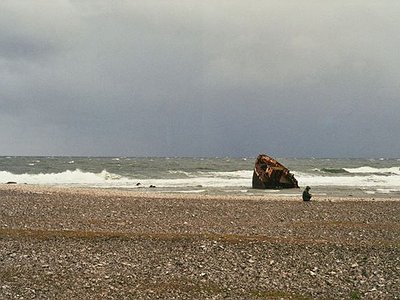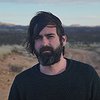With more and more musicians creating than ever and more and more of these creations being released, what does this mean for you as an artist in terms of originality? What are some of the areas where you currently see the greatest potential for originality and who are some of the artists and communities that you find inspiring in this regard?
In the area that I work in it's not something I worry about. It's great that you have so much to chose from and it's very inspiring. Each new project is something that I have never tried, for better or worse, I haven’t had a problem generating ‘original’ materials. What is confusing for me is the disconnect between artist's film and video and sound art.
Working between these two areas is strange in the sense that both communities are a touch hermetic but so closely related. Being someone that bounces between these worlds makes it hard to curate or even find a venue. I've been lucky in that I have had good labels to distribute my work that helps bridge that gap in terms of distribution. An area with a lot of potential is the proper distribution of sound works that are interdisciplinary in nature, not in the traditional sense of cinema distribution or film co-ops or traditional music releases.
With the releases I collaborated on with Senufo and Experimedia I was trying to make an attempt at that. Distributing the DVD/Bluray works with a monograph and LP. Trying to give a larger context to the work and make it accessible. I don’t think people, outside of an academic context, should have to pay so much money to be able to even access artists' work. Works that are interdisciplinary in nature, situated in multiple historical contexts, require more context sometimes.
There are some great examples of people out there trying to expand this like what Richard Skelton and Autumn Richardson are doing with Corbel Stone Press, Von Archives, Bartolomé Sanson and Félicia Atkinson work with Shelter Press and I am sure there are a load more that I am not aware of, but this is what I would love to see grow.
During the academic year I commute between Upstate New York and New York City. Bi-location can be frustrating but it's also nice as I move between periods of isolated and intense work Upstate and then to a more community-oriented experience and access to art in NYC.
Upstate, my ‘community’ is transient; it's friends and colleagues passing through or other artists that I work with on projects that are usually site-specific and involve travel.
Being in NYC is nice as there are so many things happening and it's been wonderful to experience some of that. To be in a city and have access to so many museums, galleries and organizations like Issue Project Room continually bringing in interesting work is wonderful.
How strictly do you separate improvising and composing?
Given the nature of the disciplines I work in, it's not composing in a traditional sense; both are integrated.
Collecting sounds and recording is really about listening and exploring environment. You are reacting to a space and trying to find an entry point into that environment. Like I mentioned before, it really becomes a process of trying to create an index of future possibilities for the editing process.
When I do start to edit I move between editing picture, doing sound design and improvising within the studio. I use Ableton or work with tape in the studio to work alongside parts of the soundtrack of picture that have been edited to work out new possibilities or variations of something I might not have noticed. Given that image and sound are so reciprocally bound, often if something shifts in picture or the soundtrack, it creates a shift in image too, so I am constantly bouncing between picture editing, sound design and improvisation.
How do you see the relationship between sound, space and composition and what are some of your strategies and approaches of working with them?
Sound and space directly determine composition in my practice. Sound design in narrative cinema is partially the art of effectively modelling illusory acoustics. The theatre environment is designed to posses no acoustic signature, as to not interfere with the illusion of the film world, so when creating sound for the theatre you are creating a whole world that is being hosted within that particular environment with no intent to react to the architecture, acoustics or material.
Dealing with the cinema space is additionally complicated as there is a long-standing, almost holy tradition within avant-garde film to have no sonic accompaniment with films. It works well for some films, but I am definitely not opposed to having sound with image and I think it’s a bit of a misconception that you can even have a silent film. It might be a dead space acoustically but it's still a space that’s full of sound. There are bodies and the noises that come with them, ventilation systems, humming of safety lights, the projection booth, ambient sounds from outside etc. It's like a poor anechoic chamber, but instead of hearing the sounds of your central nervous system or blood pumping through your veins, it’s the sound of someone’s digestion or nose whistling. Having a space that has spectators uncomfortably rooted in their body in a dead acoustic environment is something that feels awkward and unintended to me. I like the timeless/spaceless possibility that using sound in active environments opens up and I've been working to try and move away from the theatre space for some time.
On the other hand, I create work for installation and the gallery environment, which generally speaking is not designed with architectural acoustics in mind. This presents an entire other sound design challenge: creating works for site-specific environments. Working with a custom environment possesses obvious challenges, but it's something I am learning to deal with and playing within those spaces adds a new element to the work.
So essentially sound and its relationship to space, in my practice, is both about controlling acoustics as well modelling acoustics.
What's your perspective on the relationship between music and other forms of art – painting, video art and cinema, for example – and in how far, do you feel, does music relate to other senses than hearing alone?
My current sound work, for the most part, exists in relation to cinema. I create my sound in relation to the needs of the image and vice versa. There is a significant body of writing and discussion on sound that is continually growing, helping to promote the importance of sound in relation to perception in cinema, architecture etc.
It's strange to think of any of the senses as existing in these hermetic bubbles. I think as the interdisciplinary nature of the arts grows and things converge, hopefully it will bring with it an increasing awareness of the importance of sound, how it locates us in time and space, and why that might be integral to shaping how we experience art.
What's your view on the role and function of music as well as the (e.g. political/social/creative) tasks of artists today - and how do you try to meet these goals in your work?
I don’t see the artist or art as having one essential fixed role and I'm constantly working this out within my own practice just about what one should focus on. I would humbly suggest that perhaps this is a problem I hope artists are dealing with throughout their creative lives. Artists play a multitude of roles across different environments and cultures and I can’t speak for anyone other than myself, but within my own practice, what that role is changes for each project.
Listening is also an active, rather than just a passive process. How do you see the role of the listener in the musical communication process?
Patient listening is a learned skill.
Being an artist who uses duration as an aesthetic tool, I feel like listening and being open are key and these skills don’t always come easily, at least they didn’t for me.
I am really lucky in the sense that the way my work has been curated and presented in the past usually attracts a patient audience that seeks out this type of work.
Reaching audiences usually involves reaching out to the press and possibly working with a PR company. What's your perspective on the promo system? In which way do music journalism and PR companies change the way music is perceived by the public?
My work doesn’t reach that large of an audience, I feel like the press and music journalism help give a much-needed insight into the work and I am really appreciative of that. I’ve been lucky in the sense too that wonderful writers like Irene Bindi and Jeffrey Sconce wrote fantastic monographs for my past work.
Do you have a musical vision that you haven't been able to realise for technical or financial reasons – or an idea of what music itself could be beyond its current form?
Yes, I am working on a project right now. I was teaching a class on landscape and cinema last fall on Fårö island in Sweden and while out for a site visit found some fragments of a freighter that was wrecked in 1969 on the northern point of the island.
I've returned to this ship a few times over the years and this time I made some recordings of the hull using contact microphones but began to notice how heavily oxidized the metal was and it got me back to thinking about the remnant properties of magnetic materials, that metals to some degree retain traces of magnetism within the materials and that this is some form of material memory and is it possible to transduce this sonically? So I'm in the process of working with the last remaining tape manufacturer in the US and an industrial plant that creates pigments in the midwest in an attempt to sort out a way to convert these fragments into iron-oxide, the primary material in the manufacturer of magnetic recording tape.
I am in the midst of trying to work through the technological impediments to see if the tape heads will read the remnant charge in the iron oxide from these fragments and what the sonic potential might be? Attempting to turn something passive into an active sound source. This relationship between matter and memory and how something like this might be able to conceptually convey a history of meteorological and temporal effects is an interesting proposition to me; thinking about what sound could communicate.
Joshua's Website is joshuabonnetta.com



